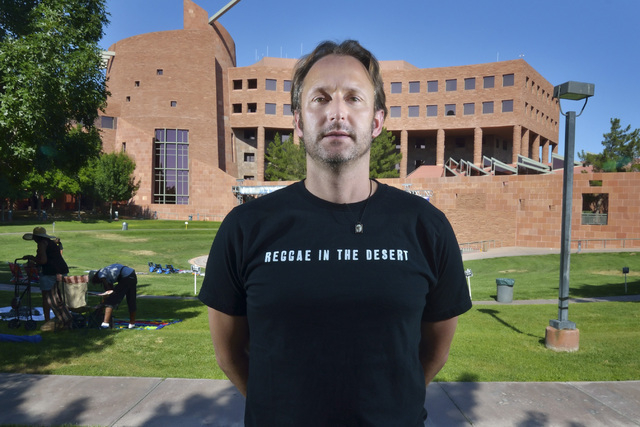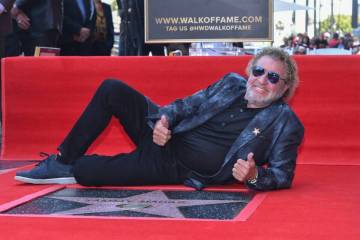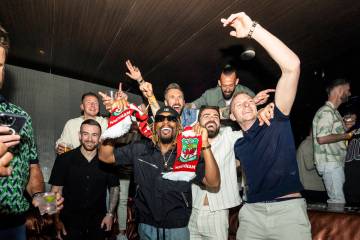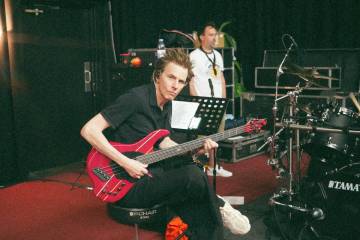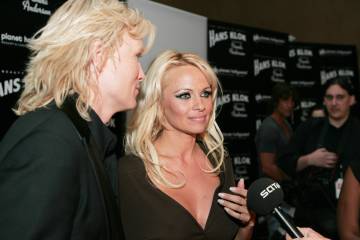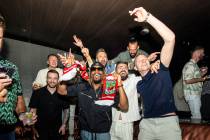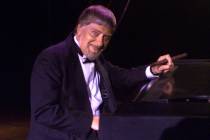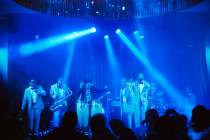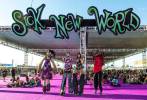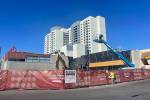Reggae in the Desert producer misses classic Vegas shows
Vegas Voices is a weekly question-and-answer series featuring notable Las Vegans.
Performance and show production are cemented in Frederic Apcar Jr.’s pedigree. Acrobats and magicians from the former Czechoslovakia go back eight generations on his mother’s side. His father, the elder Frederic Apcar, arrived in Las Vegas in 1959 and built a legacy for himself producing Parisian-style shows such as “Casino de Paris” and “Vive Les Girls” at the Dunes.
“I’m kind of bred through entertainment,” Apcar says.
It wasn’t a career he immediately embraced. Apcar played professional soccer in Europe and earned his master of laws degree. Eventually, though, he realized there truly is no business like show business and returned to Las Vegas to follow his father’s lead.
His record includes comedian Louie Anderson’s run at the Plaza and a nine-month tour of a Vegas-style production in South America with magicians the Fercos brothers. On Saturday, he will put on the 15th annual Reggae in the Desert festival at the Clark County Amphitheater. We caught up with him in advance of the festival.
Review-Journal: Your father made a name for himself producing shows, but you did a variety of things before settling on that career. How did your father’s role influence your path and lead you to eventually produce shows?
Apcar: Here’s the thing: I always wanted to get into the entertainment business. It was never the major life goal at the time because I was always going to school, and getting your degree was always pounded in my head because no one in my family went to school. So when I just fell into the business of producing and promoting, it was more for the love of show business than anything. And then as you start doing a lot of shows, certain opportunities just start coming up, and that’s really where I am today, with Reggae (in the Desert) and some of the other things that we do, it’s because of that.
R-J: Has there been a trend in the types of shows you’ve produced?
Apcar: Well, you know, in this town it’s hard. I’ve done Louie Anderson’s show at the Plaza. I think we were there for almost three years. I don’t know if it’s as much of a trend. I think it’s more the cards you’re dealt. Whatever the casinos aren’t willing to do themselves. I guess saying that you’re left with scraps is not the right term, but it’s hard to compete with the casinos. So you get into the niche genres of music or production shows, whatever it may be, because the casinos aren’t doing it, and then you have more of a chance to succeed, hopefully, right?
We used to do all the Rock the Blocks downtown, this was pre-Cosmopolitan and pre-Life is Beautiful, and we would do probably four to five of them a year. Then once the Cosmo opened, the same bands that we were putting up in that Fremont East corridor, now the hotels are paying double and we can’t compete with that. And then obviously they would rather play at the Cosmo, in an indoor venue, rather than outside on a smaller-scale street festival.
R-J: Your whole family, including yourself, has been in the entertainment business in Las Vegas for a long time. How have you seen the entertainment industry in Las Vegas change over the years?
Apcar: First and foremost, it went from the hotels either taking full risk on shows to 50-50 risk, and now a lot of times they don’t want to take any risk. And that’s where you’ve seen the evolution of bigger promotion companies like AEG or Live Nation come into the mix because they know their product so well and the hotels probably are not willing to risk the full expense of a show. Whether they share it or whether a promotion company like AEG takes full risk or not, now it’s more interesting for the hotels because they can get outside promoters, where back in the day the majority of the shows the hotels were taking risk on everything.
R-J: Has that changed the types of shows that are being produced?
Apcar: Absolutely, I think it definitely changed a lot of things. You can count on one hand probably how many real Vegas shows are left. I don’t think there are any. You have a couple of those shows that are at the Flamingo Hilton, you know, those smaller-scale burlesque shows — you know, the feathers, the rhinestones, the clothing of “Jubilee,” what’s left.
R-J: When you say a “real Vegas show,” what comes to mind?
Apcar: When I say that I mean what the history of the town is known for. I guess it’s really twofold. One, is the headliner, like that Dean Martin or Frank Sinatra of that past era. So in today’s era, it would be the Celine, the Celines of the world. Or, we’re known for the feather, rhinestone, whether it’s covered or a topless show, those really don’t exist too much anymore.
R-J: You’re involved with producing the upcoming Reggae in the Desert festival. How did you make the jump from other types of shows to a reggae festival, and what made you interested in producing this festival?
Apcar: You’re doing festivals, you’re doing different shows, you work with different agents and artists, and then the opportunity came along to get involved with reggae so over the years it’s just slowly grown and grown. I’ve always kept the ticket prices as low as we could, per the demand of whatever the artists want and it’s luckily just grown to a great community event for the city.
R-J: Is there a large reggae fan base in Las Vegas?
Apcar: I think there’s a large enough reggae fan base because reggae is that genre of music that pretty much hits your 18- to 65-year-olds. I mean, you’ve got the Parrothead Buffett fans that love reggae music, the hippies. I don’t know very many people who don’t like reggae.
R-J: Is there anything else about the reggae festival that people should know?
Apcar: The food at Reggae in the Desert, that’s one of the main things that makes the event special because we really work hard to try and get as many traditional Caribbean-style vendors out there. We’ve got people driving in from all over the country to be vendors at this event. I think that’s one of the special things about the event is the food, obviously the music, and the location. The amphitheater is beautiful.
R-J: Where would you like to see Las Vegas go, particularly the Las Vegas shows, in the next 10 to 15 years?
Apcar: I think that the current companies that are doing the shows, they’re doing a very good job on the headlining talent. Especially all these new shows at the T-Mobile Arena and the shows at The Joint, the shows at Caesars, I think they’re doing a phenomenal job. I think that movement will continue and it’ll continue getting better. But it would be nice for me, and I think for a lot of other people, to see that traditional Las Vegas show come back eventually.
R-J: Would you try to bring it back?
Apcar: Potentially. I absolutely would always be interested in doing something. But it’s got to be the right fit, the right deal. All the stars have to align. You know, that’s not easy. The entertainment business, period, is not easy.
Contact Sarah Corsa at scorsa@reviewjournal.com or 702-383-0353. Find @sarahcorsa on Twitter.



